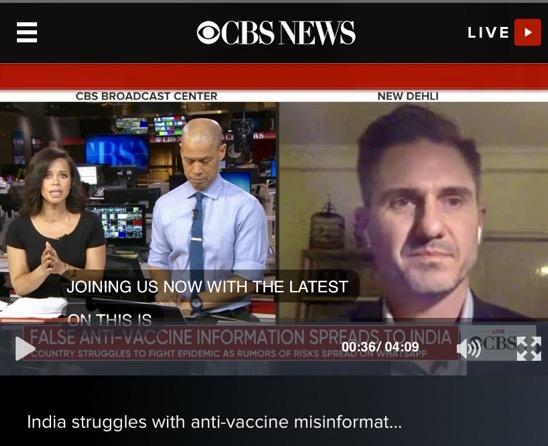
I joined CBS News’s Anne-Marie Green and Vladimir Duthiers on Monday to discuss my recent story about antivaccine misinformation on WhatsApp here in India.
The clip is online here.

I joined CBS News’s Anne-Marie Green and Vladimir Duthiers on Monday to discuss my recent story about antivaccine misinformation on WhatsApp here in India.
The clip is online here.

That’s the headline on my latest story, out Saturday. It begins:
Antivaccine misinformation, some of it from social media posts in the West, is spreading in India on WhatsApp, undermining efforts to root out measles and rubella in a country where tens of thousands of people are struck by the diseases each year.
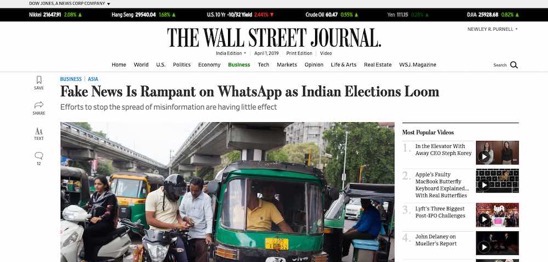
That’s the headline on my newest story, out yesterday. It begins:
NEW DELHI — In India, viral fake news is lighting up Facebook Inc.’s WhatsApp messaging app as the world’s biggest democracy prepares for national elections in the coming weeks.
Efforts by WhatsApp and the government to stop the spread of misinformation are having little effect, according to fact-checking groups and analysts.
That is a challenge for Facebook, as well as policy makers and voters grappling with digital falsehoods in India, a country of 1.3 billion people where mobile internet access has exploded in recent years.
It also provides a unique window on how Facebook Chief Executive Mark Zuckerberg’s surprising strategic shift from public postings to private messaging could play out around the world. Mr. Zuckerberg said in March that Facebook would move to a model favoring encrypted group chats like those on WhatsApp, which is popular in emerging economies including Brazil and Indonesia.
India is WhatsApp’s biggest market. Research firm Counterpoint estimates it has 300 million users, making it bigger here than Facebook. WhatsApp hasn’t released user figures since February 2017, when it said it had 200 million users in India. Since then, plummeting prices for mobile data and inexpensive smartphones have made WhatsApp the default digital town square in a country with deep societal divides.
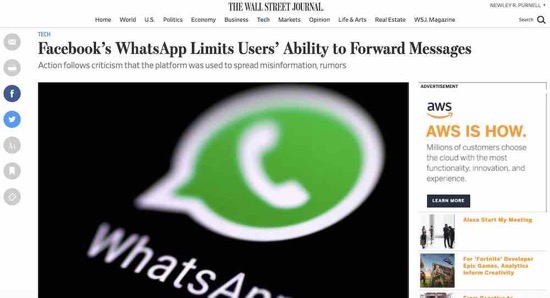
That’s the headline on my most recent story, out yesterday, with my colleague James Hookway. It begins:
Facebook Inc.’s WhatsApp messaging service is limiting users’ ability to forward content, seeking to curtail ways the popular platform allows the spread of misinformation and sometimes has led to violence.
The move, which follows months of criticism over the company’s response to such incidents, is one of the bigger changes Facebook has made to one of its core services in response to political pressure.
The company said Monday that WhatsApp’s more than one billion global users can now only forward material to five individual users or groups at once, down from 20.
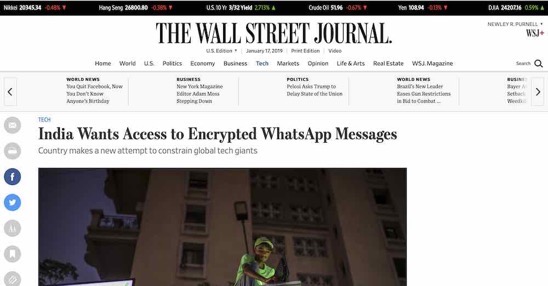
That’s the headline on my most recent story, out Tuesday and in Wednesday’s print WSJ. It begins:
NEW DELHI— Facebook Inc.’s WhatsApp is facing pressure in India to let authorities trace and read the encrypted messages of its more than 200 million Indian users in a new attempt at constraining global tech giants.
India’s telecommunications regulator has asked for feedback on new rules that—in the name of national security—could force “over the top” services such as WhatsApp, which use mobile operators’ infrastructure, to allow the government access to users’ messages.
At the same time India’s Information Technology Ministry has proposed new intermediary guidelines that would force WhatsApp and others to trace messages and remove objectionable content within 24 hours.
WhatsApp—which has more users in India than in any other country—has “pushed back on government attempts to ban or weaken end-to-end encryption and will continue to do so,” said a person familiar with the company’s thinking.
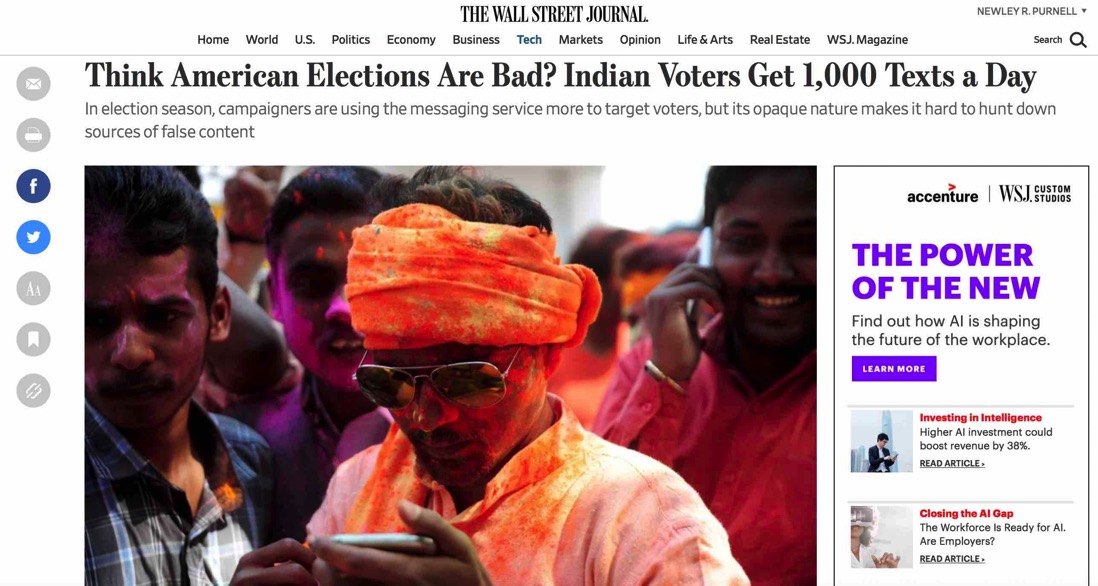
That’s the headline of my most recent story, out yesterday, which I wrote with a few colleagues. It begins:
For Gurupad Kolli, a 40-year-old lawyer who lives in a remote Indian village, the torrent of WhatsApp messages surging to his phone a few weeks ago meant one thing: election day was near.
They’re at turns strident, angry, buoyant, informative, misleading, gripping and confusing, he says. Some days he received as many as 1,000 of them through the popular messaging service. Pleased to no longer “depend on the mass media like newspapers,” the resident of Ramapur village in the southern state of Karnataka nonetheless also conceded “there’s so much false and fake news going around.”
He isn’t alone in his bewilderment. The rapidly falling cost of smartphones and mobile data in the world’s second-most-populous nation has turbocharged the spread of WhatsApp, where it is growing far faster than other social media and messaging platforms such as Twitter and Facebook.
India is home to more WhatsApp users than any other country, accounting for more than 200 million of the 1.5 billion monthly active global users. That rivals the popularity in India of Facebook Inc., which owns WhatsApp. Tens of millions of Indians of all ages have made the messaging service, which is simple to join and use, their entry point to the world of digital communication, especially in poor, remote areas where users are flocking to the internet for the first time.
Click through to read the rest.
Users of the popular messaging app WhatsApp can now conduct their chats via a Web browser — with a few restrictions.
The Facebook-owned service with some 700 million monthly active users said in a blog post Wednesday that people can now link their mobile phones with a WhatsApp Web client, allowing them to write and read messages via their computers.
There are, however, a few limitations to the setup. First, those with iPhones are out of luck due to “Apple platform limitations,” WhatsApp says. The service works with Android, BlackBerry, Nokia S60 and Windows devices, but users need the latest version of WhatsApp.
To start, WhatsApp users can visit Web.WhatsApp.com via Google’s Chrome browser on their computers, where a QR code will appear.
Click through for instructions on how to set it up.
And, yes, an you’ll see an image of a WhatsApp conversation I had via a Web browser…with myself.
As I said on Facebook earlier: Anything in the name of journalism.
Quick note to share a WSJ story I helped out on Thursday about challenges Facebook may face in Asia following its acquisition of WhatsApp:
Facebook Inc. ‘s $19 billion deal for WhatsApp in part is a move to bolster the U.S. company’s position abroad.
But in Asia—which has the world’s largest, and possibly most avid, social-media audience—Facebook still has its work cut out for it.
That is because in Asia, even more than on Facebook’s home turf, the big, growing social-media market is on mobile phones. And if Facebook wants to be as dominant on smartphones in Asia as it has been on personal computers, WhatsApp will need to lure users away from three popular apps in the region: Naver Corp.’s Line, Tencent Holdings Ltd. ‘s WeChat and Kakao Corp.’s Kakao Talk.
Visit WSJD for more stories on the deal.